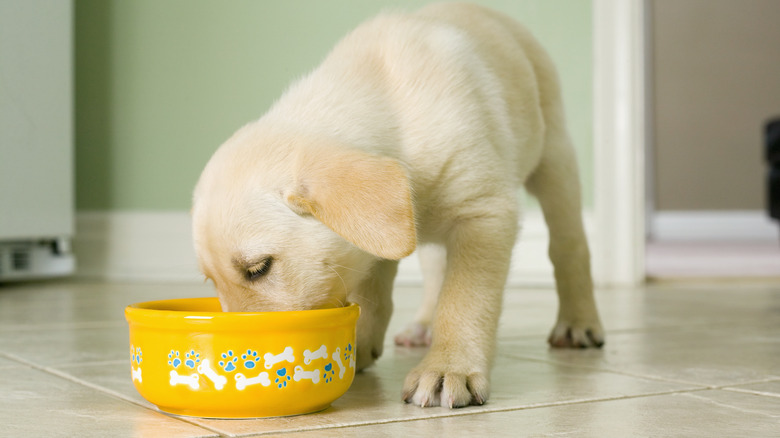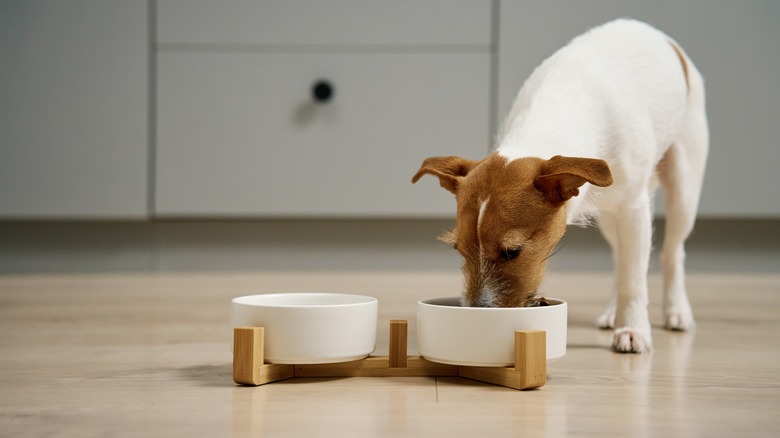What's The Difference In Nutritional Value Between Dog Food And Puppy Food?
At a first glance, puppy food and adult dog food might not seem all that different. Both varieties typically feature dry, brown kibble that may vary in size, or wet food with chunks of meat. However, if you think you can give a puppy regular dog food, or vice versa, think again. Puppy food serves a purpose as it has a completely different nutritional value than regular dog food.
Puppies are consistently getting bigger, and require specific nutrients to supplement their growth. Because of this, puppy food generally contains much higher levels of fat, protein, calcium, and phosphorus than regular dog food. Many puppy foods also boast a higher amount of omega-3 fatty acids, which are essential for a puppy's brain development. It is also usually higher in calories than adult dog food to help promote healthy muscle and size growth. Adult dog food, on the other hand, is formulated to help dogs maintain their weight and general health when they're fully grown. Although it still contains many essential vitamins and nutrients, they're usually present in lower quantities than what you get in puppy food.
Giving a puppy regular, adult dog food means putting them at risk of not receiving enough of these vital nutrients, which can lead to developmental issues or bone diseases. Giving an adult dog food puppy food, meanwhile, puts them at risk for taking in too many calories, which can lead to other health problems like obesity. Ensuring that your dog has their needs met means making sure they're eating the appropriate food for their current life stage.
When to switch from puppy to adult food
Per petMD, puppies will typically be ready to make the switch to adult food when they are around 80% of their adult size. However, since size may be difficult for a new pet parent to determine, that may not be the best gauge for when to switch. The AKC states that small breed puppies are usually able to make the switch around the seven-to-nine month mark, whereas larger breeds might not be able to switch until they are up to 14-months-old.
Still, figuring out when it's time to switch your specific pup to adult food depends on a number of additional factors, such as their breed. Different breeds grow at different speeds, and a chihuahua will likely be ready to make the adult food switch before a medium or large breed dog such as a German shepherd or Newfoundland. The other thing to consider is activity level. If your puppy is highly energetic and athletic, you may want to keep them on puppy food longer to make sure their calorie and protein needs are being met. Spaying and neutering can also play a role in the type of food your pup needs, as puppies who have been fixed don't usually need as many calories as those who haven't. It's important to get advice from a vet to determine what will work best for your pup.
Choosing the right food for your puppy
When buying puppy food, you first want to look for labels that indicate it is made specifically for younger dogs. Sometimes, a brand may use terminology like "formulated for growth" to indicate this. Next, you'll want to look at the nutritional content. Generally, a high-quality puppy food will contain all of the essential nutrients puppies need to grow, including fat, calcium, protein, amino acids, carbohydrates, and phosphorous.
How much of each one your specific pup needs is a question to take up with your vet, as nutritional requirements can vary depending on the breed. Large breed puppies, for instance, require food that is lower in calcium, phosphorous, and fat, as too much of these nutrients can cause them to grow too quickly and develop skeletal issues. Because of this, many brands offer puppy food specifically made for large breeds. These will usually be marked by a label that indicates it meets the standards for large breeds by the Association of American Feed Control Officials Dog Food Nutrient Profiles (AAFCO).


